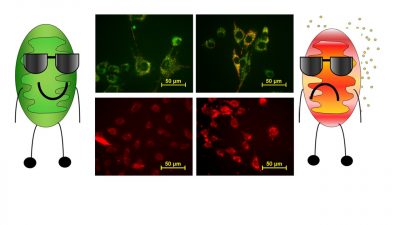Hello World! This is our first blog post and our recent conference at the National American College of Sports Medicine (ACSM) meeting seemed like a great time to share what we are currently up to in our laboratory. Megan (Me) Rosa-Caldwell and Dr. Greene both gave talks at ACSM, with Dr. Greene hosting a symposium.
First some quick background on the overall arch of our talks. MITOCHONDRIA! Mitochondria are our main energy producers in our cells, they work by sucking electrons and oxygen through specialized proteins that help generate usable energy for our cells. While mitochondria are making usable energy, they generate reactive oxygen species (ROS), which can damage cells if we make too much. A lot of research over the past few years has focused on mitochondria making too much ROS as the cause of shrinking muscle during diseases such as cancer. This shrinking muscle (termed cancer cachexia) can be very problematic for cancer patients, as it reduces quality of life and can affect the effectiveness of chemotherapy.
Dr. Greene hosted a symposium titled “Emerging Mechanisms for Exercise Effects on Muscle Wasting and Anabolic Resistance” where he gave a talk titled “Mitochondrial Degeneration as a Precursor to Muscle Wasting.” He discussed how mitochondrial dysfunction contributes to muscle wasting. His main highlight was discussing one of our laboratory’s more recent papers (open access article found here) where we investigated how cancer progression affects muscle mitochondria and contributes to cachexia. For this study we measured muscle mitochondrial function and health over a timecourse of tumor development. We found that mitochondrial health is changed before you can even see a tumor or before you can see muscle wasting. This is important because our study showed that mitochondria become unhealthy before muscle shrinks during cancer, which gives us a possible mechanism to possibly treat and prevent muscle wasting in the future.

Dr. Greene discussed how during cancer, mitochondrial become unhealthy, which then leads to muscle wasting.
Dr. Greene also shared the stage with Dr. Jim Fluckey from Texas A&M, Dr. Brad Gordon from Florida State University and Dr. Jim Carson from The University of South Carolina. Who also discussed various aspects of muscle health.

I discussed how tumors release factors into the blood which can directly cause mitochondria to become unhealthy. Top images: mitochondrial polarization (more red=more polarized), bottom superoxide production (more red=more superoxide).
My talk followed up on this study looking directly how cancer cells can affect muscle cells. Our previous study showed that cancer causes muscle mitochondria to go wonky. However, because it was in animals, we could not determine if the cancer was directly causing muscle problems or if the cancer was indirectly affecting the muscle through interacting with other organs. I took media from cancer cells and placed it on muscle cells in a dish. This caused the muscle cells to become overactive and then release more ROS. My small study demonstrated that cancer cells can directly interact with muscle to cause muscle wasting.
We are back in Fayetteville and ramping up for a summer of science! Between prepping a plethora of samples, we also have some exciting experiments coming up, as well as welcoming new lab members including: PhD student Seongkyun Lim from Eastern Carolina University, Master’s student Kirsten Dunlap, and Undergraduate student Quinn Grafton.
Cheers to a summer of #scienceing!
Megan